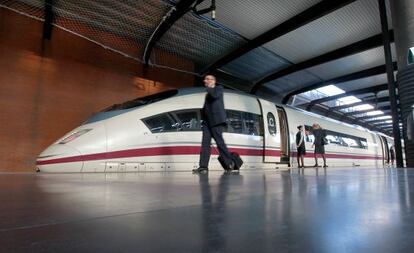Anti-trust regulator questions privatization plan for state railway
Watchdog criticizes decision to pass major reform of the sector without debate


The nation's market competition regulator says it has doubts about the effectiveness of government plans to open up Spain's state-owned rail system to private competitors next year.
In a report released on Thursday, the National Competition Commission (CNE) states that, as it exists now, the state railway operator Renfe has certain advantages that will make it difficult for private operators to compete.
On July 20, the Popular Party government of Prime Minister Mariano Rajoy announced a shake-up of the rail industry involving the freeing up of the sector to welcome private operators, and the elimination of Feve, which operates services in the northern regions. The decision was passed by the Cabinet in the form of a decree, a move the commission also criticizes.
By next July, Renfe will still remain the public operator of the Spanish rail system, but the company will be broken up into four entities that will be dedicated to providing passenger service, heavy transport and logistics, maintenance and railcar manufacturing, and rentals.
Public Works Minister Ana Pastor justified the changes by saying that the government would save some 2.5 billion euros annually that it currently allots to the sector.
Renfe's losses last year totaled some 335 million euros compared with 19.8 million in 2010.
Renfe, the state-holding Administrator of Railroad Infrastructure (Adif), and Feve, which operates routes in Cantabria, León, Galicia and Bilbao, have a combined debt of 20.7 billion euros.
Feve is slated to be closed in January and its services will be swallowed up by Renfe.
The entire process should be completed by July 31, 2013, and the government has still not ruled out going further in seeking a private investor for Renfe.
"The idea behind the reform, in certain crucial aspects for the future performance of the market, is clearly indeterminate," the CNE said in its report. "Nor does it explain how other draft regulatory elements for introducing competition and liberalization would be effective."
The report puts in doubt how private operators will be able to compete with the advantages Renfe will still have. "It will continue to be entitled to exploit the network's capacity, which it has used effectively, at the time that such opening up of the market takes place," the anti-trust authority highlighted. In other words, Renfe will not have to make room for its rivals.
Because of the significance of these changes, the watchdog criticizes the government for choosing to undertake them by decree instead of allowing Congress to study the proposed overhaul.
"In what has become increasingly recurring practice, a legislative reform has again been submitted in an expeditious and partial manner on an industry whose regulation requires a thorough review so that a truly possible enhancement for effective competition can take place," the CNE's report states.
The commission, however, does see the breakup of Renfe into four companies as a positive move, but points out that it must go beyond what has been stated on paper. Each company must be effectively independent of each another, not "merely formally and legally" but also at the "accounting and operating levels."
"In particular, there should be guarantees for complete independence in operations, legal affairs, and accounting of the manufacturing units and maintenance and leasing of rolling stock," says the report, which adds that all these elements should be "explicitly made" in the decree text.
The board also points out as a good move the "welcoming of private partners" in operational management.
According to the Public Works Ministry, Renfe's losses last year totaled some 335 million euros compared with 19.8 million in 2010.
In July, Pastor said there were 52 medium-distance regional trains that travel with 15-percent passenger capacity on average. There are 176 train stations and stops across the country that only average about one passenger a day.
But the rail sector's overhaul could cost some 10,000 jobs. Combined, Renfe, Adif and Feve employ about 30,000 people.
Rail workers unions last month began a series of strikes that they plan on carrying out through September. Union officials believe that opening up the sector will mean poorer service, higher passenger fees and increased risks of accidents.
Tu suscripción se está usando en otro dispositivo
¿Quieres añadir otro usuario a tu suscripción?
Si continúas leyendo en este dispositivo, no se podrá leer en el otro.
FlechaTu suscripción se está usando en otro dispositivo y solo puedes acceder a EL PAÍS desde un dispositivo a la vez.
Si quieres compartir tu cuenta, cambia tu suscripción a la modalidad Premium, así podrás añadir otro usuario. Cada uno accederá con su propia cuenta de email, lo que os permitirá personalizar vuestra experiencia en EL PAÍS.
¿Tienes una suscripción de empresa? Accede aquí para contratar más cuentas.
En el caso de no saber quién está usando tu cuenta, te recomendamos cambiar tu contraseña aquí.
Si decides continuar compartiendo tu cuenta, este mensaje se mostrará en tu dispositivo y en el de la otra persona que está usando tu cuenta de forma indefinida, afectando a tu experiencia de lectura. Puedes consultar aquí los términos y condiciones de la suscripción digital.








































